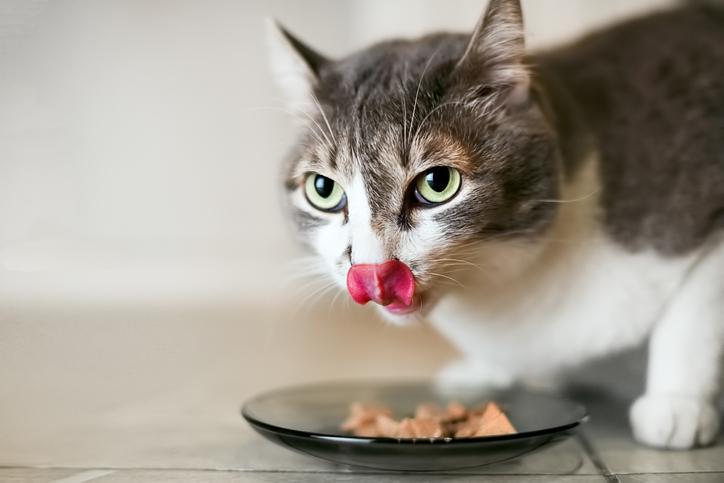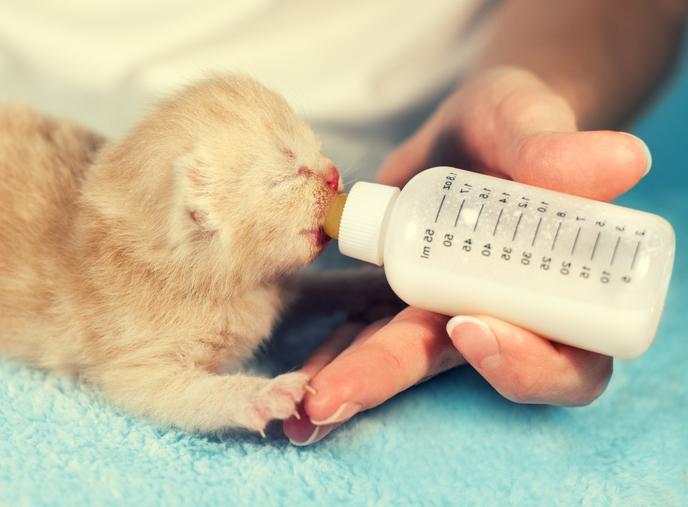How Often Should I Feed My Cat?



See files for Cats
Cats are known for being independent and low-maintenance pets, but they are not so independent when it comes to food. Most cats love to eat and can be quite vocal about their hunger if not fed on time. However, overfeeding your cat can lead to digestive problems and obesity, while underfeeding can lead to underweight.
There is no one-size-fits-all answer to the question of how often to feed a cat, as it depends on the cat's age, activity level, and overall health.
In the following AnimalWised article, we will discuss how often to feed kittens, adult cats, and senior cats, and provide a day-by-day guide for each age group.
How often do cats eat in the wild?
In the wild, cats are solitary hunters and eat multiple small meals throughout the day and night, typically around 10 to 20 small meals per day. These frequent meals help them meet their nutritional needs and maintain their energy levels as they expend energy hunting and patrolling their territory.
Their hunting and feeding patterns are influenced by the availability of prey in their environment. These frequent meals help them meet their nutritional needs and maintain their energy levels as they expend energy hunting and patrolling their territory.
The number of times a cat eats in the wild also depends on other factors, such as the cat's age and health, and the time of year. For example, kittens and pregnant or lactating cats may need to eat more often.
Domestic cats, on the other, may retain some of these natural feeding behaviors, but their meal frequency can vary based on their diet and routine.
How often should I feed my newborn kitten?
Newborn kittens have very specific feeding needs, and they should be fed quite frequently to support their rapid growth and development.
During this stage, the mother's milk is essential for kittens' growth and development. It provides them with the nutrients they need to build strong bones and muscles, develop their immune systems, and protect them from infection. Mother's milk also contains antibodies that help kittens fight off disease.
However, sometimes we care for orphaned kittens or kittens who cannot access their mother's milk for other reasons. In these cases, you must bottle-feed your kitten. In the following sections, we will explain in more detail how often to feed kittens, both by their mothers and by bottle.
Birth to 1 week old
During their first week of life, newborn kittens are entirely dependent on their mother's milk. If the mother cat is present and able to nurse, they should nurse freely whenever they want, usually every 1 to 2 hours.
If the mother cat is not available or unable to nurse, consult your veterinarian for guidance on appropriate milk replacers and a feeding schedule. In general, you need to bottle feed the kitten every 2-3 hours, round-the-clock. This means that you will need to feed them at least 8 times a day, and possibly up to 12 times a day.
1 to 2 weeks old
As kittens reach 1 to 2 weeks of age, they may still nurse every 1 to 2 hours, but you might start noticing longer intervals between feedings, especially at night.
During this phase, you still should bottle-feed the kitten every 2-3 hours, round-the-clock.
2 to 4 weeks old
By the time kittens are 2 to 4 weeks old, they begin to show more interest in solid food. You can start introducing a gruel-like mixture of wet kitten food softened with warm water. Continue to provide them with milk or milk replacer, but gradually decrease the frequency of bottle-feeding sessions to encourage them to transition to solid food.
Kittens may still nurse or bottle-feed every 2 to 3 hours during this period, but they should also be offered the wet food mixture.
4 to 6 weeks old
As kittens approach 4 to 6 weeks of age, their reliance on mother's milk or milk replacer decreases further, and they should be consuming more wet food.
At this stage, you can typically feed them every 3 to 4 hours. They should continue to have access to the wet food mixture.
6 Weeks and older
Beyond 6 weeks of age, kittens should be well on their way to transitioning to solid kitten food. By 8 weeks, they can typically eat dry or wet kitten food without softening.
At this stage, you can reduce the frequency of feedings to around 4 times a day, gradually shifting toward a regular adult cat feeding schedule.
It is important to note that some kittens may still nurse occasionally for comfort.
Remember that these are general guidelines, and each kitten may need different things. It is important to watch your kitten's growth, behavior, and overall health.
To learn more about weaning kittens and how to choose the best food for their needs, be sure to read our article on weaning kittens.

How to feed a kitten
As mentioned earlier, kittens should nurse from their mother for the first few weeks of life whenever possible. Mother's milk provides vital antibodies and nutrients that are essential for their health and well-being.
If the mother cat is unavailable or unable to nurse, you will need to bottle-feed the kitten. Kitten milk replacer formula is available at most pet stores. To bottle-feed your kitten, follow these guidelines:
- Wash your hands thoroughly with soap and water.
- Warm the formula to match the kitten's body temperature.
- Support the kitten in your lap or arms while cradling its head.
- Gently introduce the bottle's nipple into the kitten's mouth.
- If the kitten struggles to latch on, gently squeeze the bottle to stimulate milk flow.
- Allow the kitten to feed at its pace, never force-feeding.
It's essential to provide kittens with a diet that supports their growth, rich in protein and calories. You have the option to choose dry food, wet food, or a combination of both for their meals. It's particularly important to ensure they have access to fresh water, especially if you decide to feed them dry food.
Here are some general feeding guidelines for kittens:
- Provide your kitten with fresh water at all times.
- While kitten treats can be employed for training, limit them to prevent excessive calorie intake.
- Create a peaceful and comfortable feeding environment for your kitten.
- Avoid offering human food to your kitten, as it may be harmful to their health.
As always, we recommend consistent veterinary check-ups are essential to ensure your kitten's well-being. Your veterinarian can offer guidance on vaccinations, deworming, and any dietary adjustments required for your kitten's specific requirements.
To learn more about how to provide your kitten with the best possible care, be sure to read our article on caring for kittens.

How often should I feed my adult cat?
The frequency of feeding for adult cats can depend on various factors, including their age, activity level, and dietary preferences.
For many adult cats, feeding them twice a day is ideal. This mimics a natural hunting pattern, where cats in the wild catch smaller meals throughout the day. Split their daily portion into two equal servings, once in the morning and once in the evening.
Some cat owners choose to leave dry kibble out for their cats to nibble on throughout the day. However, this method can lead to overeating and obesity if not closely monitored. It's best suited for cats with excellent self-control.
If your cat has specific dietary requirements, or you're feeding them wet food, scheduled meals may work better. You can serve meals three or even four times a day, with smaller portions. Keep an eye on your cat's weight and energy levels. If they're gaining excess weight, you may need to adjust the portion size or feeding frequency.
Cats with certain medical conditions, such as diabetes, may require a more structured feeding routine. Your vet will advise you on the best approach.
In general, always consult with your veterinarian for personalized recommendations. They can assess your cat's age, weight, activity level, and any health concerns to provide tailored advice.
To learn more about what to feed your cat and how to choose the best food for their needs, see our other article on cat nutrition. In this article, we cover a wide range of topics related to cat nutrition, including essential nutrients, common food allergies, and feeding tips for kittens, adult cats, and senior cats.
How often should I feed my senior cat?
Feeding a senior cat requires special attention, as their dietary needs change with age. Senior cats (usually aged 7 and older) tend to have slower metabolisms and may be less active than younger cats. This makes them more prone to overeating and obesity, so it is important to control their portions.
It is also important to switch your senior cat to a high-quality senior cat food. These foods are specially formulated to meet the changing nutritional needs of senior cats, including joint support and reduced calorie content.
It is crucial to monitor your senior cat's weight, as sudden weight loss or gain can be a sign of underlying health problems. Consider dividing their daily food portion into multiple smaller meals. This can help prevent digestive issues and ensure they get enough nutrients throughout the day.
Most senior cats do well with being fed twice a day, which is consistent with the feeding schedule recommended for adult cats. This schedule provides them with two main meals to meet their nutritional needs.
However, some senior cats may prefer or benefit from having their daily food portion divided into multiple smaller meals throughout the day. This can be especially helpful if your senior cat has a decreased appetite or digestive issues.
Remember that individual cats may have unique dietary requirements, so it is important to work closely with your veterinarian to develop a feeding plan that best suits your senior cat's needs and ensures their overall health and well-being.

If you want to read similar articles to How Often Should I Feed My Cat?, we recommend you visit our Healthy diets category.
- Baciero, Gemma. The key in the treatment of feline urolithiasis is urinary dilution . Axon Veterinaria nº 42. pp. 42-45.
- Le Brech, Susana. (2020). Stress-related improper elimination problems . Webinar.







